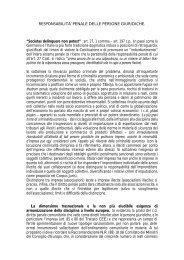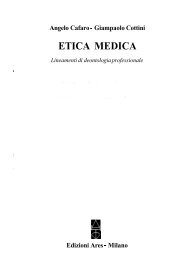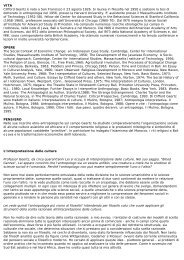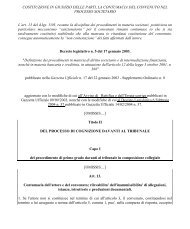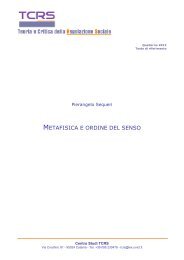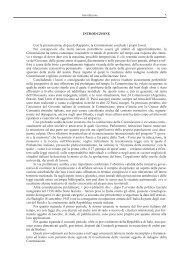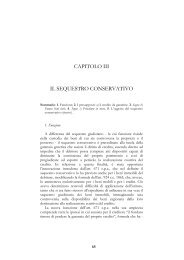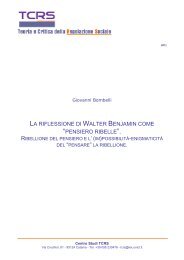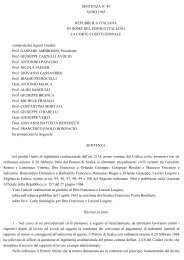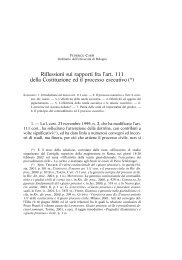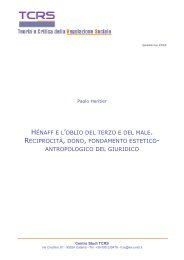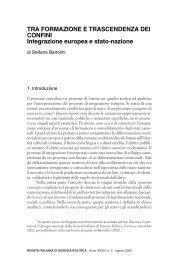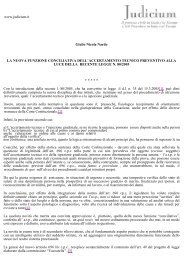FOGLI DI LAVORO per il Diritto internazionale 3 ... - Giurisprudenza
FOGLI DI LAVORO per il Diritto internazionale 3 ... - Giurisprudenza
FOGLI DI LAVORO per il Diritto internazionale 3 ... - Giurisprudenza
You also want an ePaper? Increase the reach of your titles
YUMPU automatically turns print PDFs into web optimized ePapers that Google loves.
<strong>FOGLI</strong> <strong>DI</strong> <strong>LAVORO</strong> <strong>per</strong> <strong>il</strong> <strong>Diritto</strong> <strong>internazionale</strong> 3/2008<br />
In effetti, la mancanza di attenzione <strong>per</strong> la problematica<br />
in esame era legata al fatto che, al tempo, lo stesso istituto della<br />
riserva era in fase di definizione, specie alla luce del celebre parere<br />
reso della Corte Internazionale di Giustizia nel 1951 sulla<br />
Convenzione delle Nazioni Unite <strong>per</strong> la prevenzione e la repressione<br />
del crimine di genocidio 14 . Così, anche <strong>il</strong> Rapporto Lauterpacht<br />
del 1953 non si occupò specificamente delle dichiarazioni<br />
interpretative 15 .<br />
Come è stato sottolineato in dottrina 16 , <strong>il</strong> momento di<br />
svolta si ebbe nel 1956 con <strong>il</strong> primo Rapporto Fitzmaurice 17 , che,<br />
finalmente, prese separatamente in considerazione <strong>il</strong> tema. L’art.<br />
tions», in Encyclopedia of Public International Law, Amsterdam, 1984, p.<br />
497; C. LOGAN PIPER, «Reservations to Mult<strong>il</strong>ateral Treaties: the Goal of Universality»,<br />
in Iowa Law Review, 1985, p 300; G. GAJA, «Unruly Treaty Reservations»,<br />
cit., p. 441 ss.; osserva che si tratta dell’atteggiamento prevalente tra<br />
i depositari dei trattati R. SAPIENZA, Dichiarazioni interpretative, cit., p. 224).<br />
Solo a volte, a dispetto della mancata previsione <strong>per</strong> le dichiarazioni interpretative<br />
della procedura di comunicazione e consultazione propria delle riserve,<br />
<strong>il</strong> Segretario Generale richiede chiarimenti allo Stato dichiarante (F. HORN,<br />
Reservations, cit., p. 270; L. MIGLIORINO, Le obiezioni alle riserve, cit., p. 8;<br />
P. T. B. KOHONA, «Some Notable Developments», cit., p. 440). Maggiore dimestichezza<br />
con la tematica delle dichiarazioni interpretative viene invece<br />
mostrata da alcuni Stati e dai vari organi che, di volta in volta, svolgono la<br />
funzione di depositari; ci si riferisce in particolare agli Stati Uniti (W. W. BI-<br />
SHOP, «Reservations», cit., pp. 307 e 311 s.; M. M. WHITEMAN [prepared and<br />
cured under the direction of], Digest of International Law, 14, Washington,<br />
1970, p. 188 s.), all’Unione Panamericana (F. HORN, Reservations, cit., p. 357<br />
ss) e al Segretario Generale del Consiglio d’Europa (ib., p. 367 ss.).<br />
14<br />
Corte Internazionale di Giustizia, 28 maggio 1951, Reservations to the<br />
Convention on the prevention and punishment of the crime of genocide (Advisory<br />
opinion), in ICJ Reports, 1951, p. 14 ss. Con tale parere la Corte, sovvertendo<br />
<strong>il</strong> principio dell’unanimità fino ad allora dominante, affermò <strong>per</strong> la prima<br />
volta che le riserve possono essere formulate anche a prescindere da previsioni<br />
espresse, purché non siano incompatib<strong>il</strong>i con l’oggetto e con lo scopo<br />
del trattato (<strong>per</strong> i necessari approfondimenti si rinvia, ex multis, a G. G. FI-<br />
TZMAURICE, «Reservations», cit., p. 1 ss.).<br />
15<br />
A/CN. 4/63. Quattro delle cinque versioni dell’art. 9 che furono proposte<br />
in tale rapporto definivano la riserva come una dichiarazione “limiting<br />
or otherwise varying the obligations of any article of the treaty”; tale formulazione,<br />
secondo R. SAPIENZA, Dichiarazioni interpretative, cit., p. 127, non<br />
esclude del tutto che le dichiarazioni interpretative possano rientrare nella categoria.<br />
16<br />
R. SAPIENZA, Dichiarazioni interpretative, cit., p. 128 ss.<br />
17<br />
A/CN. 4/10.<br />
45



